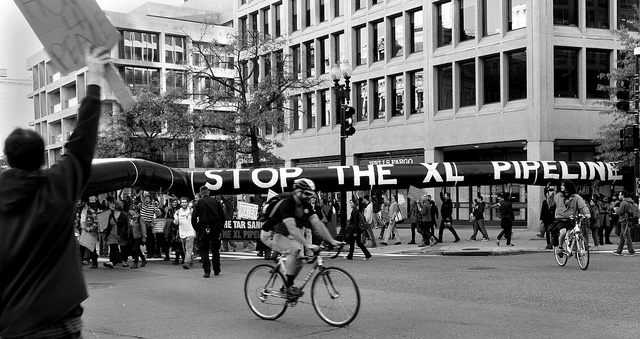
Environmental and Indigenous groups filed two lawsuits yesterday challenging the Trump administration’s recent decision to issue a cross-border permit for the Keystone XL pipeline that would bisect the nation and carry carbon-heavy crude oil from the tar sands of Canada to the Gulf of Mexico.
Last week, President Trump issued a ceremonial “presidential permit” to TransCanada, the company behind the pipeline, and instructed the State Department to reverse a 2015 decision by the Obama administration to deny a federal permit needed for construction. The State Department quickly issued the permit, which is now being challenged by environmental groups.
Tom Goldtooth, director of the Indigenous Environmental Network, one of the groups challenging the permit, said President Trump is breaking “established environmental laws” and treaties with Native Americans in his attempt to push the pipeline through.
“Indigenous peoples’ lands and waters are not here to be America’s environmental sacrifice zone,” Goldtooth said in a statement.
Opposition to fossil fuel infrastructure projects like major oil pipelines has become central to the movements for climate justice and Native rights. Over the past seven months, the Native-lead resistance organized by the Standing Rock Sioux and others to the Dakota Access Pipeline in North Dakota inspired people to action around the country and the world, and resistance to the pipeline’s southern leg in Louisiana has also taken form.
The Indigenous Environmental Network joined the North Coast Rivers Alliance in challenging Trump’s Keystone XL permit under several federal environmental laws, including laws protecting endangered species and bald eagles. The groups also say the State Department’s federally required review of the pipeline’s environmental impacts is inadequate and was prepared by a contractor with substantial conflicts of interest due to its close ties with the oil and gas industry.
In a separate lawsuit filed on Thursday, six environmental groups argue the State Department’s environmental review, now three years old, is inadequate and out of date. The groups also say the Trump administration broke the Administrative Procedures Act, the law governing how federal agencies establish regulations, by “arbitrarily” reversing the Obama-era decision to block the pipeline. The Interior Department’s Bureau of Land Management, which is expected to issue its own permit for the pipeline soon, is also named as a defendant.
Tar sands oil is one of the “planet’s most environmentally destructive energy sources” and is expected to contribute to climate disruption, according to the six groups’ complaint. Tar sands crude is particularly heavy and viscous, making it very difficult to clean up in the event of a spill. The pipeline would carry more than 800,000 barrels of crude oil from Canada’s tar sands across the country each day.
“The Trump administration broke the law by arbitrarily approving the Keystone XL tar sands pipeline,” said Anthony Swift, a project director at the National Resources Defense Council, one of the groups that filed the lawsuit. “And it ignored public calls to update and correct a required environmental impact statement that should have led to one conclusion: Piping some of the dirtiest oil on the planet through America’s heartland would put at grave risk our land, water and climate.”
Under President Obama, the State Department took years deliberating over the Keystone XL permit before ruling in 2015 that the pipeline was contrary to national interests, such as combating global warming. During those years of deliberation, Keystone XL became a political football in Congress and, for environmentalists, a potent symbol of the dangers posed by fossil fuels. Protesters swarmed Washington to oppose it.
Trump is now undoing Obama’s climate legacy piece by piece. Earlier this week, the Trump administration formally began the process of dismantling carbon fuel and energy standards designed to help the United States fulfill international climate agreements and stave off the worst effects of anthropogenic climate disruption.
The president has also lifted environmental restrictions on coal mining and called on federal agencies to expeditiously approve permits for the Dakota Access and Keystone XL pipelines.
Environmentalists have pledged to challenge Trump’s assault on environmental and climate protections in court and warned Republicans in Congress that voters would punish them in the midterms for rolling back Obama-era environmental regulations aimed at reducing air and water pollution.
Both lawsuits against Trump’s Keystone XL permit were filed in a federal district court in Montana and seek an immediate injunction, which could stall construction of the pipeline.
The lawsuits are not the pipeline’s only roadblocks. State regulators have yet to approve a plan for the pipeline’s path in Nebraska, where the project is not popular among landowners.
Keystone XL and other pipelines have come to represent a political ideology that recklessly values private profits over people and the future of the Earth, and activists are expected to resist their construction outside of court as well. Indigenous activists will continue to be on the front lines.
“For too long, the US government has pushed around Indigenous peoples and undervalued our inherent rights, sovereignty, culture and our responsibilities as guardians of Mother Earth and all life, while fueling catastrophic extreme weather and climate change with an addiction to fossil fuels,” Goldtooth said.
Join us in defending the truth before it’s too late
The future of independent journalism is uncertain, and the consequences of losing it are too grave to ignore. To ensure Truthout remains safe, strong, and free, we need to raise $24,000 by the end of today. Every dollar raised goes directly toward the costs of producing news you can trust.
Please give what you can — because by supporting us with a tax-deductible donation, you’re not just preserving a source of news, you’re helping to safeguard what’s left of our democracy.